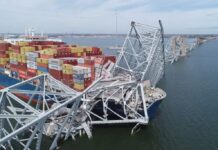Congress and states love to create small, discrete programs to solve big transportation problems. They don’t like to stop the types of investments that are causing the problems, even when far more money is perpetuating the issues those new programs are meant to solve. With historic amounts of infrastructure funding headed into states’ hands even as streets are growing more dangerous and we urgently need environmental solutions, it’s time to change that strategy.

Our transportation system has a problem. Every time Congress tries to solve a big transportation challenge, they’re only willing to invest in a small solution.
Take the new infrastructure law (the IIJA). To help fix today’s issues related to climate, safety, equity, and repair, Congress set aside small pots of cash. Then they dumped the rest of their cash into a whole lot more of the same.
Congress doesn’t seem to realize that they’re just feeding the beast, as seen in our latest illustration by visual artist Jean Wei. Flexible formula funds, their favorite one-size-fits-all solution to infrastructure woes, are making our climate, safety, equity, and repair needs worse.
It’s true that states don’t have to use these flexible dollars this way. In fact, they can easily use these funds to address the problems that they claim are priorities. But that’s not what they’ve historically done. Instead, they’ve used formula funds to build more and more dangerous roads. And they’re willing to go to bat over their right to use these funds to make their problems worse. At a recent Senate committee hearing, Senator Capito made this cyclical argument:
This is a bipartisan bill that we passed. There is a climate title in there. There is an emphasis on funding resiliency, greenhouse gas mitigation, carbon emissions, healthy streets. This is an area that we are deeply committed to. But these are grant programs, these are not the formula dollars that go out. So I want to make the distinction and, would you agree, these are two separate programs, or pots of money so to speak? So the discussion that I’m having with you on this guide, doesn’t really apply to the climate title parts of the bill.
She’s saying that all of the new, little grant programs they created in the IIJA are designed to solve those (enormous!) problems. But the enormous piles of formula dollars are sacrosanct and they are for roads, bridges, or whatever each state decides is most important—not those other issues.
It’s clear that the small climate title alone isn’t going to be able to do the heavy lifting to reduce emissions and improve resiliency. The same is true for money set aside for safety, repair, and equity. To address these priorities, states can and should use their flexibility and dip into the historic levels of formula funds that are readily at their disposal. The longer they continue to pretend that these smaller programs are enough, all while going all-in on building more dangerous roads, the larger the beast will grow.
Share our cartoon on Facebook and Twitter!
The post Pro-tip: Invest in the solution, not in the problem appeared first on Transportation For America.












